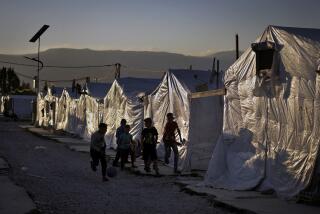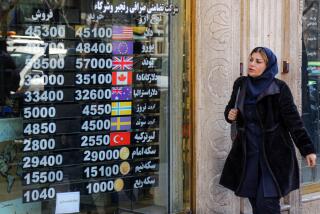Turnabout Could Hurt His Bid for Presidency : Iranians’ Return a Political Embarrassment for Chirac
- Share via
PARIS — Premier Jacques Chirac, as he opens his campaign for the presidency of France, will have a hard time shaking away the fumbling and embarrassing image of his government’s handling of anti-Khomeini Iranian refugees--first expelling them to please Iran and then suddenly reversing the order to quiet French public opinion and the rest of the world.
Members of the People’s Moujahedeen of Iran, who had fasted in Paris, London, Washington and Libreville, the capital of Gabon, to force Chirac to change the expulsion order, were jubilant Friday as they welcomed back seven Iranians in France and five other Iranians in Spain. The French government had sent planes to bring the twelve Iranians and three Turkish refugees back from Gabon on Thursday.
Socialist supporters of President Francois Mitterrand were gloating over the cave-in of the Chirac government. Since the affair began, Mitterrand had made it clear that he disapproved of the expulsions. His wife had even demonstrated her sympathy by visiting the fasting Iranians in Paris.
The Iranian refugee affair, in the view of some analysts, had made the government look rather shortsighted in its handling of a delicate matter and may have tattered its overall Iranian policy. But Chirac was obviously trying to push all this far behind him as he prepared to announce today his candidacy for the presidential election. Public opinion polls put Chirac far behind in the elections that will be run in two rounds, the first on April 24 and the second two weeks later.
Tough, Aggressive Stance
Chirac, in fact, has made it clear that he intends to take a tough and aggressive stance whenever the issue of the expulsions is raised. In a television interview Thursday, for example, he denied that his government’s decision to bow to pressure and reverse the order amounted to a defeat for him.
Chirac said that his Ministry of Interior had expelled the Iranians to Gabon last Dec. 7 as part of his program “to rid France of terrorists.” He said that the French government had allowed the Iranians to fly back to France on Thursday “for humanitarian reasons” only because their leaders had agreed that “they would no longer do anything in France to destablize another country, notably their own.” If they persisted in such subversive activity, the premier went on, they would be expelled again, this time to Baghdad.
Moujahedeen leaders, however, denied that they had made any pledge to the French government to halt their activities against the government of the Ayatollah Ruhollah Khomeini.
In forceful tones, Chirac also denied what almost every French newspaper accepts as fact-- that his government expelled the Iranian refugees in the first place as part of a payment to Iran for persuading Shia Muslim extremist groups in Beirut to release two French hostages Nov. 27.
“There has been no bargaining,” he said. “There is not a single link between the two affairs.”
Mitterrrand Leads in Polls
The polls show that Mitterrand, if he decides to seek reelection, would easily defeat either of the two main conservative candidates, Chirac and former Premier Raymond Barre. Although the 71-year-old Mitterrand has refused to announce his plans, many analysts now believe that the temptation to run again will be too great to resist.
Chirac’s embarrassment over the Iranians could even nudge Mitterrand closer to a candidacy. Officials at the Elysee, the presidential palace, told journalists that the outcome of the refugee affair “conformed to what the president wished.”
The return of the Iranians also raised the question of France’s policy of what it calls “normalizing” relations with Iran while it tries to obtain the release of the three French hostages still in the hands of extremists in Beirut. Le Monde, the Paris newspaper, said that the government may have “mortgaged its credibility.”
Some French analysts doubted that Khomeini could accept a surrender by the French government to his his most bitter Iranian foe, Massoud Radjavi, the Moujahedeen leader who was expelled by France to Iraq in June, 1986.
Expelled to Gabon
After the police roundup in early December, the Chirac government expelled 14 Iranian refugees and three Turkish Kurds to Gabon. The roundup was so hurried and confusing that it reinforced suspicions that the act was done only to repay the Iranian regime for the release of the hostages. Two of the Iranians, in fact, had residence permits in other European countries and were allowed to return to their homes several weeks ago. It was never clear why the Turks were included in the expulsion.
The expulsions were not the only or the most important element in the evident deal. The Chirac government had already allowed the departure to Tehran of an Iranian Embassy official whose refusal to testify about terrorist bombings in Paris had led to a break in diplomatic relations months before.
The Chirac government expected the affair of the expulsions to blow over quickly but was frustrated by the determination of the expelled Iranians in Gabon and their supporters elsewhere to fast to attract attention to their cause. The ability of Moujahedeen to whip up international support also surprised the Chirac government.
Pressures on Chirac mounted slowly. Not only did many French dislike what smacked of a deal but they were disturbed by what seemed like a break with the French tradition of political asylum.
Widespread Protests
The U.N. High Commissioner for Refugees protested several times. American and European legislators signed petitions of protest. Mitterrand’s displeasure helped turn public opinion against the act. Socialists started to make it a political issue. Members of Chirac’s conservative coalition also announced their concern. The Moujahedeen’s lawyers took the cases to the French courts. In fact, even as the Iranians were flying from Gabon on Thursday, French courts declared most of the expulsion orders invalid.
On top of this, Chirac realized that the Moujahedeen were serious about their fast. In view of all the concern about the fairness of the expulsions, a death could have been a political disaster for him.
At first, Chirac stubbornly resisted reversal. Only four days ago, he insisted that there was no question of his government changing its decision. Yet, he finally gave in. Obviously convinced that he must try to cut his losses, Chirac approved an agreement, worked out between Minister of Interior Charles Pasqua and Moujahedeen leader Radjavi, that would allow the 12 remaining Iranians and the three Turks to leave Gabon for Spain and France “for humanitarian reasons.” In exchange, the Mujahedeen promised to end their fast.
More to Read
Sign up for Essential California
The most important California stories and recommendations in your inbox every morning.
You may occasionally receive promotional content from the Los Angeles Times.













